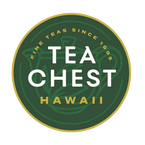
5 Pillars of Wellness
Living through a pandemic has made me more intentional about staying healthy. I like learning what others do to stay healthy and I appreciate that tea can be more than simply something to sip. It supports most wellness routines and the 5 Pillars of Wellness.
David Wong owns Mountain View Farms and grows the moringa we use in several blends. Besides being a rancher and farmer, David is also a cancer survivor. What intrigued me about David’s story is he is in remission without chemotherapy and surgery. I asked him what he focused on during "treatment" and he shared the “5 Pillars” mindset with me. The cancer took years to grow. Simply cutting it out meant the cancer would likely return. The 5 Pillar mindset changed his body from the inside and made it less conducive for cancer growth.
This blog is not an endorsement of any treatment protocol. I’m realizing we are magnificently made to be resilient but modern conveniences and mass produced foods work against us. We are well fed (1 in 3 Americans are overfed) but we’re one of the sickest countries on earth. Our nation suffers high rates of preventable illnesses and disease and these conditions are being perpetuated in our children at younger and younger ages. The cost of healthcare is out of control. We can break this cycle if we change the way we think and behave.
The 5 Pillars of Wellness is a holistic mindset that includes:
- Diet
- Exercise
- Stress Management
- Sleep
- Positive Mental Attitude (PMA)
Pillar #1 - Diet
This pillar supports wise eating to maintain a healthy immune system that shields us from illness and prevents chronic diseases. According to Healthline, a healthy gut contributes to a strong immune system, heart health, brain health, improved mood, healthy sleep, and effective digestion, and it may help prevent some cancers and autoimmune diseases. (1)
Eat fresh foods for better nutrition versus processed foods filled with “empty” calories. Chemicals used in our food supply can wreck gut health and diminish immunity. Consuming sustainably grown vegetables and grass fed meats that are free of hormones and antibiotics reduce the chemicals we ingest. Less chemicals in food production also malama aina, protects the land for future generations.
Beyond water, drinking tea is a flavorful way to stay hydrated. Researchers continue to connect components of tea with healthful properties. Tea is packed with antioxidants which help to eliminate destructive compounds in the body called free radicals, which overload our cells by damaging our proteins, DNA, and lipids.(2) There’s even an Oxygen Radical Absorbance Capacity (ORAC) scale to measure antioxidant activity in foods. All the ingredients in MANA | Tea for Immunity were selected for their high rankings.
Pillar #2 - Exercise
Staying active supports overall well-being. Regular exercise also shakes off the cobwebs to keep the mind sharp.
The natural caffeine in tea can provide a natural energy boost and heighten endurance during physical activity. (3) The antioxidant EGCG in tea can up the body’s ability to turn fat into fuel (thermogenesis). Green tea and teas that contain turmeric like ‘OLENA can help to ease inflammation and speed recovery. OLENA has quickly become a favorite to ease muscle soreness, inflammation associated with exercise and discomfort caused by arthritis.
Pillar #3 - Stress Management
Prolonged anxiety is toxic to the mind and body. Learning to keep stress at bay helps improve overall well-being. Drinking tea, researchers have found, lowers levels of cortisol, a stress hormone, and over the long term a tea habit (a half-cup of green tea per day) could lower the risk of depression and dementia. Ashwagandha, found in our NANEA blend, is a powerful adaptogen that has been shown in numerous studies over decades to battle stress and chronic conditions related to stress. (4)
L-theanine found in green and black teas provide a nirvana effect sending soothing signals to the brain to promote relaxation.(5) Learn more about tea for anxiety and stress.
Pillar #4 - Sleep
The body needs restful sleep to recharge daily; the mind needs to reset to cast off each day’s stress and re-energize. Sleep is when the body heals and repairs itself. Lack of restful sleep is linked to increased risk for a multitude of diseases and conditions.(6)
Although tea in general has less caffeine than coffee, caffeine free herbals that contain chamomile like Lemon Chamomile and lavender such as Maui Earl Grey loose tea and tea bags, have a long history for their calming effect. Jasmine teas like Jasmine Mamaki loose tea and tea bags plus Jasmine Dragon Phoenix Pearls are two other popular soothing teas. Other ingredients that promote restful sleep include valerian root and passionflower.
Pillar #5 - PMA - Positive Mental Attitude
Researchers continue to explore the effects of positive thinking and optimism on health. Health benefits that positive thinking may provide include an increased life span, better psychological and physical well-being as well as reduced risk of cardiovascular disease.
It's unclear why optimistic people experience these health benefits. One theory is that having a positive outlook enables you to cope better with stressful situations, which reduces the harmful health effects of stress on your body. (7)
Conclusion
Cancer runs in my family so when David shared this mindset with me, I felt hopeful that I could be proactive with my health and not simply a genetic statistic. I realized that if David was able to reverse the course of his cancer I can do it too and if I can do it then you can do it also.
At Tea Chest Hawaii, the pressures of the pandemic have turned our focus to helping people stay well. We carry this philosophy into 2022 with well-being front of mind. The tips above should not replace common sense preventative care like seeing your personal care physician regularly.
Resource links:
- https://www.healthline.com/health/gut-health#the-takeaway
- https://www.uchealth.org/today/the-health-benefits-of-drinking-tea/
- https://healthland.time.com/2012/09/04/13-reasons-to-love-tea/
- https://www.ncbi.nlm.nih.gov/pmc/articles/PMC3252722/
- https://www.nature.com/articles/d41586-019-00398-1
- https://www.webmd.com/sleep-disorders/benefits-sleep-more
- https://www.mayoclinic.org/healthy-lifestyle/stress-management/in-depth/positive-thinking/art-20043950


Comments
Annie Meadows
I appreciate these sort of articles and the knowledge they provide. I have faithfully begun every morning with Green Jasmine Mamaki Tea for possibly 20 years! The benefits are obvious.
March 02, 2022
Leave a comment